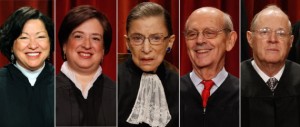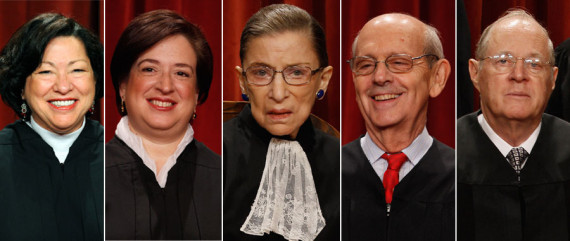By a narrow margin, the Supreme Court (SCOTUS) has declared same-sex marriage to be legal in all 50 states, irrespective of any previous laws passed or supported by the people in those states.

The Huffington Post tells us:
The U.S. Supreme Court ruled 5-4 on Friday that it is legal for all Americans, no matter their gender or sexual orientation, to marry the people they love.
The decision is a historic victory for gay rights activists who have fought for years in the lower courts. Thirty-seven states and the District of Columbia already recognize marriage equality. The remaining 13 states ban these unions, even as public support has reached record levels nationwide.
The justices found that, under the 14th Amendment, states must issue marriage licenses to same-sex couples and recognize same-sex unions that have been legally performed in other states.
(Sidebar: Could the phrase “the people they love” possibly be extended to mean more than one partner? And how about those who regard their German shepherds as “people,” too? In light of this ruling, could there be wedding bells in Rover’s future?)
As a justification for their decision, the majority invoked a constitutional amendment, the law that was meant to redress the wrongs of black slavery but which has since been used to justify many other unrelated things, such as illegal “immigration”:
The justices found that, under the 14th Amendment, states must issue marriage licenses to same-sex couples and recognize same-sex unions that have been legally performed in other states.
A National Journal article goes into detail about the dissenters in this decision, John Roberts, Antonin Scalia, Clarence Thomas, and Samuel Alito, all of whom seem to agree that the ruling isn’t merely unconstitutional but anti-constitutional. We commend that article to you, from which come these excerpts:
[Chief Justice] Roberts’s argument centered around [sic] the need to preserve states’ rights over what he viewed as following the turn of public opinion. In ruling in favor of gay marriage, he said, “Five lawyers have closed the debate and enacted their own vision of marriage as a matter of constitutional law.”
[A sarcastic Scalia] wrote that while he has no personal opinions on whether the law should allow same-sex marriage, he feels very strongly that it is not the place of the Supreme Court to decide. “Until the courts put a stop to it, public debate over same-sex marriage displayed American democracy at its best,” Scalia wrote. “But the Court ends this debate, in an opinion lacking even a thin veneer of law.”
Thomas pilloried the majority opinion as “at odds not only with the Constitution, but with the principles upon which our nation were built.”
[And Alito argued] that gay marriage is not protected in the Constitution under the Due Process Clause because “liberty” only applies to those principles that are rooted in U.S. tradition. His argument is that the concept of gay marriage is new and therefore not included.
Alito also issued a warning concerning judicial supremacy:
“Even enthusiastic supporters of same-sex marriage should worry about the scope of the power that today’s majority claims. Today’s decision shows that decades of attempts to restrain this Court’s abuse of its authority have failed.”
Look for more about this decision on The American Culture in the future.


